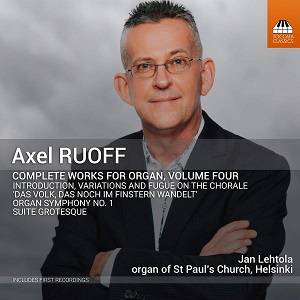
Axel Ruoff (b. 1957)
Complete Works for Organ Volume Four
Introduction, Variations and Fugue on the chorale ‘Das Volk, das noch im Finstern wandelt’ (2005)
Suite grotesque (2019)
Symphony No. 1 (2013)
Jan Lehtola (organ)
rec. 2021/22, St Paul’s Church, Helsinki
First recordings except symphony
Toccata Classics TOCC0672 [84]
Axel Ruoff is a German composer and academic whose compositions include oratorio, choral music, pieces for wind band, orchestra and no less than 5 concertos for a variety of instruments, 2 for piano and one each for guitar, ‘cello and horn. He has also composed stage works and chamber music. On the basis of having listened to this disc of his organ music, one would be intrigued to hear how he approaches other genres. The forms of compositions that he has chosen, Variation, Suite and Symphony, would appear to place him firmly within the German tradition of organ music, although the Suite and Symphony may indicate a leaning towards the French school.
The disc opens with the single most intense work, the Introduction, Variations and Fugue on the chorale Das Volk, das noch im Finstern wandelt. Translated into English, the title is ‘The people that walked in darkness’, familiar to English-speaking audiences from Handel’s setting of the words in Messiah. Certainly, the Introduction recalls similar passages from Reger’s organ music, but as the Variations progress, it becomes clear that Ruoff has worked a number of influences into a distinctly personal musical style. While the form may seem to be Germanic, the keyboard figuration suggests the world of Langlais and in places, Messiaen. Everything seems to have been totally assimilated, yet the exposition of the very substantial Fugue does not contain anything that Reger would have scorned to write. This is preceded by 13 variations which are widely varied in mood and tempo, the theme appearing in an extraordinary array of guises. The Fugue, at a duration of 9.44, rivals Reger in its slow, intense progress towards the climax, where the chorale rings out in enormous chords, finally resolving on a major triad.
The Suite grotesque (2019), the most recent work presented here, seems to indicate a return to France in style. The names given to the movements, Prélude, Danse champêtre, Marche Héroïque, and Finale, would seem to leave no doubt and the musical language is certainly Gallic, with suggestions not only of French organ composers, but also the insouciance of Poulenc. Yet, surprisingly, the blend of styles does not startle the listener or suggest any lack of stylistic integrity. What we have is a contemporary composer who combines a wide compositional palette with a complete formal command of his material. The set of variations, although shorter than the Symphony in duration, makes more demands on the listener, but does not outstay its welcome.
Toccata Classics has an established reputation for producing high quality recordings of contemporary music and the opportunity to get to know new music of such quality is to be greatly valued. The standard of production is always uniformly high, as are the performances. The only quibble one might have in this instance is with the notes by Cornelis Witthoefft. These are thorough and very detailed, but really contain too much technical analysis for the listener coming to this music for the first time. As a contribution to an academic journal, it would be ideal, but something less intimidating for the non-specialist reader is required here.
Jan Lehtola is an excellent advocate for this music, seemingly making light of the technical challenges and holding the listener’s attention throughout. The recording is excellent and the organ in St Paul’s Church, Helsinki , an instrument of 52 stops, has all the colour and variety that the music requires. A most satisfying release.
Martyn Strachan
Help us financially by purchasing from





















